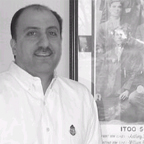
Longtime Society member Maureen Couri said the Itoo Society, named after a small village in northern Lebanon, was formed in 1914 by a group of immigrant Lebanese men to help and support their own members through hardship and tragedy. “It became a mutual-aid group, dedicated to helping each other through hard financial times, moral support for those struck by tragedy, help for those who needed English language skills and gaining American citizenship, and also a place for fellowship and social activities.”
She said the group’s activities were expanded after the first World War to help the needy in the village of Itoo, Lebanon, which was greatly affected by the war.
The Itoo Society has always been family oriented, stressing its members’ heritage and culture, Couri said. “The main activities are charitable works to benefit the community in Peoria and villagers in Itoo. As the members work together on these projects, they become a more cohesive group, especially since most have known each other since childhood.”
Women of the Itoo formed their own Ladies’ Itoo Society in 1916, and Couri said the group is a strong force in the Society. Both groups—two parts of a whole, she said—participate in the Itoo’s main annual events: the Itoo Supper in November and the Shish Kabob in June. Charitable events include the St. Jude Dinner, the Down Syndrome Spaghetti Dinner, Race for the Cure Champagne Breakfast, a fund raiser for the elementary school in Itoo, and numerous benefits throughout the year. On the social side, the Club sponsors fish fries and weekly ballroom dancing.
The Itoo Society has adopted St. Jude Children’s Research Hospital as its pet cause and over the years has made significant financial contributions, said Pat Schelt. “The Society has worked for many years—actually since Danny Thomas first presented his dream in Peoria to the Lebanese people—to aid in establishing a cure for leukemia and cancer in children. Through the cooperation of the Itoo Lebanese people and ALSAC (American Lebanese Syrian Associated Charities), Peoria became the first satellite hospital for St. Jude.”
In addition to its charitable and social aspects, the Itoo Society is very much a business, Schelt stressed. “Its existence as a business entity is to provide a contribution to the community vis-a-vis its meeting place—not only for business purposes, but also providing a location for public fund raising events.”
The Society’s population has increased dramatically in the last 100 years, Couri said. “There are hundreds of people in Peoria who can trace their lineage to our first settlers in the early 1900s. As they married and educated their children, those children went from managing grocery stores and working in Peoria’s industries to becoming professional people, with many outstanding doctors, lawyers, teachers, accountants, and business owners among them.”
Schelt said although exact numbers aren’t known, there are thousands of Peoria-based members of the Lebanese community. “It’s believed there are more Itooans in the Peoria area than there are in the town of Itoo, Lebanon.
Through the Itoo Society, the central Illinois community has become aware of the Lebanese people and their culture, as well as the country of Lebanon, Schelt said. “Its members have been able to educate the community to the fact that the Lebanese people are a Christian, charitable people, and Lebanon constantly strives to remain a neutral, Christian country, which is quite difficult due to the turmoil in the mid-East.”
While a shared culture is a main attraction of Itoo, over the years it has become more open. “We’re still a tightly knit group because of family ties, but we now have a diversity of members,” Couri said. “Spouses of members are warmly welcomed.”
Couri said change has been the biggest challenge the Itoo Society has faced. “To survive, we must change with the times while still holding onto the values and traditions that have kept us together. The most rewarding part has been continued contact with lifelong friends, neighbors, and relatives who share our problems, values, and ideas.” IBI

